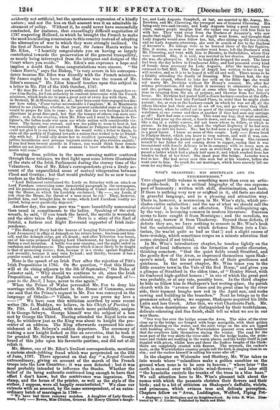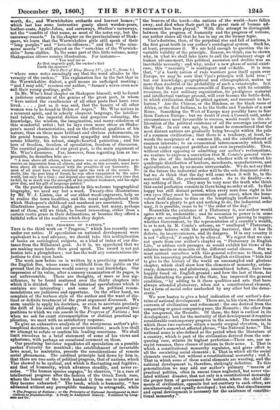WISE'S SHAKSPERE HIS BIRTHPLACE AND ITS NEIGHBOURHOOD. *
Tins elegant little volume is something more than even an artis- tic guide-book. It is a critical biography of the one supreme poet of humanity ; written with skill, discrimination, and taste. If there is nothing very new or orig4nal in it, old facts are stated in graceful language, and in a pleasing and attractive way. There is, however, a mannerism in Mr. Wise's style, which pre- cludes entire satisfaction ; and the use of what we should call the dictatorial I, is in itself an affectation. This soliloquizing ego, by the way, is becoming common in modern literature. Emerson seems to have caught it from Montaigne ; and the novelists, we should say, borrow it from Thaokeray. Beyond these defects, if defects they are, we have nothing to censure in Mr. Wise's book but the unintentional libel which defames Milton into a Uni- tarian, (he was'nt quite as bast as that !) and a slight excess of hero-worship, which sometimes verges on a minute adoration that seems strained if not trivial.
In Mr. Wise's introductory chapter, he touches lightly on the subject of local influences on the formation of poetic character, thinking somehow, "that the quiet fields round Stratford, and the gentle flow of the Avon, so impressed themselves upon Shak- spere's mind, that his nature partook of their gentleness and quietness. In the second chapter, Mr. Wise takes you to the little country town' in the Vale of the Red Horse," and gives you a glimpse of Stratford in the olden time, of " Henley Street, with its timbered high-gabled houses ; " in one of which the great poet was probably, or at any rate, possibly born. In the third chapter he bids us follow him to Shakspere's last resting-place, the parish church with its "avenue of limes and its great elms by the river side, their topmost boughs now red in the April sun, and rooks cawing and building in the branches." Next he brings us to the grammar school, where, we suppose, Shakspere acquired his little Latin and less Greek. After this, we visit Charlecote Park. Mr. Wise, whose descriptions are distinguished by their truthfulness, delicate colouring and line finish, shall tell us what we see in our way there.
"Our way lies over the bridge across the Avon. The sides of the river close up to the bridge are fringed with large marigolds, with their golden shadows floating on the water, and the osier twigs on the site are tipped with budding silver, where the Warwickshire peasant even now believes that the swallows hide themselves during the winter. The road for the most part of the way skirts the river-side. On the hedge banks, the prim- roses and violets are nestling in the warm places, and the hedge itself is just dappled with green, whilst here and there the leafless boughs of the black- thorn are completely crusted with flowers. The wryneck,. the cuelcoo'a mate, as the Warwickshire country people call the bird, is singing close as an elm ; and the cuckoo himself is calling his name afar off."
In the chapter on Welcombe and Shottery, Mr. Wise takes us into woods where " celandines make a golden sunshine on the ground when none is to be seen in heaven ; " where later "the earth is snowed over with white wind-flowers ; " and later still "the hyacinths encircle the trunks of the trees in a blue haze." We call attention here to Mr. Wise's pleasant talk about the names with which the peasants christen their flowers and their birds ; and to a bit of criticism on Shakspere's daffodils, violets, and primroses, which evinces true and delicate rroeption. Chapters follow on "Avon, Luddington, Welford, Piping Pet- * 84akspere : his Birthplace and its Neighbourhood. By John B. Wise. Mee" trated by W. J. Linton. Published by Smith and Elder. worth, &o., and Warwickshire orchards and harvest homes;" which last has some instructive gossip about warden-pears, leather-coats, Apple-Johns, and carraways, Shallow's carraways, not the "comfits of that name, as most of the notes say, but the carraway-russets." In the chapter on the provincialisms of Shak- spere, we learn that the Warwickshire girls still speak of their "long purples" and " love-in-idleness ; " and that "the nine- mens' morns " is still played on the "corn-bins of the Warwick- shire" farm-stables. In the same part of this little volume, many Shaksperian idioms receive illustration. For instance— "You used me so
As that ungentle gull, the cuckoo's bird Useth the sparrow." Pint Part of Ring _Henry IV., (Act V., Scene 1.) "where some notes amusingly say that the word alludes to the voracity of the cuckoo." The explanation lies in the fact that in the Warwickshire dialect, a gull means an unfledged nestling ; "and I may add," resumes our author, "farmer's wives even now tall their young goslings, gulls."
In Mr. Wise's final chapter on Shakspere himself, will be found a judicious estimate of the genius of the great poet, in whom "were united the excellencies of all other poets that have ever
lived just as it was said, that the beauty of all other women was to be found in Helen of Argos." Mr. Wise notices in a reverent spirit, and in soberly eloquent language, the intellec- tual talents, the imperial diction and gorgeous colouring, the knowledge, the wisdom, the imagination, and many-sidedness of this wonderful artist ; but he lays even more stress on Shake- pere's moral characteristics, and on the effectual qualities of his nature, than on these more brilliant and obvious endowments, on his genial humour, his universal sympathy and tolerance, his serene hilarity, his robust, simple-hearted patriotism ; and his love of freedom, freedom of speculation, freedom of discussion. The essential goodness of our great poet, is the main argument of Mr. Wise's discourse. Far, however, from regarding him as im- peccable, he describes him as— "A man above all others, whose nature was so sensitively framed as to receive an impression from all objects, and who, on this account, must have been above all others scourged with the penalties of our humanity. He most of all must have been stretched upon the rack of the senses. No doubt, like the poet king of Israel, he was often vanquished by the outer world, but only for a time ; and depend also upon this, that every time that befell, by so much was the strength of his intellect weakened, and his sight grew dim, and his gift of language palsied."
On the purely decorative element in this welcome topographical biography, we need say but a word. Twenty-five illustrations by Mr. W. J. Linton, one of our ablest wood-engravers, help us to realize the town localities, and the rural neighbourhood with which Shakspere's childhood and manhood are associated. These illustrations possess but slight poetic merit, but many, perhaps most of them, will we think, be found interesting, either from a certain rustic grace in their delineations, or because they afford a faithful reflex of the realities which they depict.



























 Previous page
Previous page